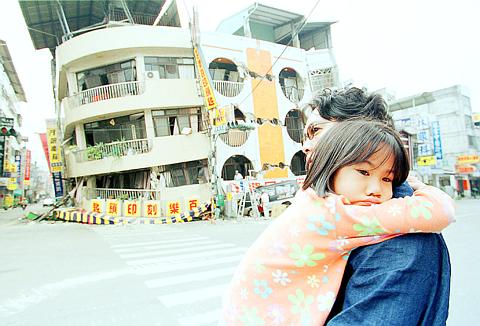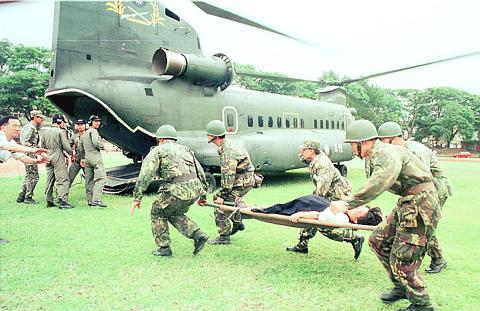Powerful aftershocks continued to shake Taiwan yesterday following Tuesday's deadly earthquake, delaying rescue work as emergency teams continued to dig through piles of twisted metal and concrete left by collapsed buildings, searching for survivors.
Rescue efforts were centered on the two worst-affected areas of Tai-chung and Nantou Counties near the quake's epicenter, but also continued in Taipei.
The Central Weather Bureau recorded a strong aftershock at 8:14am, measuring 6.8 on the Richter scale and centered in the mountains near Chichi, Nantou County, approximately 200km south of Taipei. It was followed by a less powerful temblor half an hour later, measuring 6.1. Another with a strength of 6.0 struck early yesterday evening.

PHOTO: LIN CHENG-KUNG, LIBERTY TIMES
The aftershocks, which were felt throughout the island, collapsed more buildings, triggered rock and mud- slides, and partially damaged the Sun Moon Lake Reservoir near the epicenter. Residents in areas adjacent to the reservoir were urged to evacuate their homes. Reports said dam managers were releasing water from the reservoir as a precaution.
Seismologists also warned there could be more aftershocks in the days to come, cautioning the public to be prepared.
Altogether there have been more than 2,000 aftershocks following the main quake early Tuesday morning which had a strength of 7.6.

PHOTO: SHING TING-WEI, LIBERTY TIMES
As of press time the Disaster Management Center said 2,034 people were confirmed dead. Another 6,536 were injured and 2,308 were trapped, while 208 were still listed as missing.
The day's rescue efforts had yielded just nine people pulled alive from the wreckage compared with more than 300 dead. The chances of many more victims being found alive looked slim.
Workers who had already cleared blocked roads in some mountainous regions found themselves having to repeat their efforts as the aftershocks shook loose fresh mud and other debris.
In Taichung County's Fengyuan a sniffer dog's whimper was regarded as a hopeful sign that someone was still alive under the rubble of a toppled 12-story building.
But hope was fading fast as the number of bodies surpassed the number of those still alive.
"I don't think there will be any more survivors," said one neighbor who only gave her name as Liu. "This morning they already found three people. All were dead," she said, watching a chain of soldiers wearing surgical masks clear debris from the pile of concrete, tile and splintered wood.
The aftershocks made people in the disaster-stricken areas all the more anxious to get to safety.
Panicking survivors in Puli, Nantou County, close to the epicenter of the quake, tried to leap into helicopters as they picked up the wounded or dropped off medical and food supplies.
One pilot said he had to fight off a small crowd who dangerously overloaded his aircraft when he landed at a high school.
"There is only space for 10 people," he said. "I wish I could carry out everyone. I feel like crying. However loud the helicopter is, I can still hear the people howling at me."
Another pilot described how a fist-fight had broken out between two families at Puli as he explained he could not take them all.
"We had to split the family up and leave the ones who weren't injured," he said.
As rescue efforts went into their second day, around 500 personnel from 14 nations, many armed with experience from the recent disaster in Turkey, were in Taiwan to aid the rescue efforts.
Rescue teams from the US, Japan, Singapore, Russia, the Czech Republic, Switzerland, and Austria have all arrived on the island, some teams accompanied by sniffer dogs. Mean-while Spain, Britain, Israel, South Korea, and Thailand have contacted the Ministry of Foreign Affairs to offer rescue teams.
The United Nations Office for the Coordination of Humanitarian Affairs (OCHA) has sent a seven-member evaluation team to Taiwan to coordinate rescue work carried out by foreign rescue teams. The OCHA decided to send the humanitarian assistance after consultations with China, which did not pose any objection.
OCHA may only provide assistance if it is requested to do so by a sovereign government. Since the UN recognizes Beijing as the sovereign government of Taiwan as part of its "one China" policy, in theory providing assistance depended on it being asked to do so by Beijing.
It remains uncertain whether Beijing made such a request or OCHA suggested it provide aid and then sought Beijing's approval. A spokesman for Taiwan's foreign ministry, however, said yesterday that Taiwan had certainly not asked OCHA for UN assistance.
The ministry was prepared, however, to let the UN team enter Taiwan because it felt that disaster relief took precedence over political disputes.
Later, Liu Teh-hsun (
Liu was responding to a statement by a spokesperson for Beijing's foreign ministry that Beijing thanks the international community for their sympathy and aid to Taiwan. Such remarks implied that Beijing controlled Taiwan and could speak for its people.
Meanwhile, condolences from world leaders continued yesterday, with Canadian Prime Minister Jean Cretien and Tibetan spiritual leader the Dalai Lama expressing shock and sadness at the disaster.
In a letter to President Lee Teng-hui (
Finance Minister Paul Chiu (

CHAOS: Iranians took to the streets playing celebratory music after reports of Khamenei’s death on Saturday, while mourners also gathered in Tehran yesterday Iranian Supreme Leader Ayatollah Ali Khamenei was killed in a major attack on Iran launched by Israel and the US, throwing the future of the Islamic republic into doubt and raising the risk of regional instability. Iranian state television and the state-run IRNA news agency announced the 86-year-old’s death early yesterday. US President Donald Trump said it gave Iranians their “greatest chance” to “take back” their country. The announcements came after a joint US and Israeli aerial bombardment that targeted Iranian military and governmental sites. Trump said the “heavy and pinpoint bombing” would continue through the week or as long

TRUST: The KMT said it respected the US’ timing and considerations, and hoped it would continue to honor its commitments to helping Taiwan bolster its defenses and deterrence US President Donald Trump is delaying a multibillion-dollar arms sale to Taiwan to ensure his visit to Beijing is successful, a New York Times report said. The weapons sales package has stalled in the US Department of State, the report said, citing US officials it did not identify. The White House has told agencies not to push forward ahead of Trump’s meeting with Chinese President Xi Jinping (習近平), it said. The two last month held a phone call to discuss trade and geopolitical flashpoints ahead of the summit. Xi raised the Taiwan issue and urged the US to handle arms sales to

BIG SPENDERS: Foreign investors bought the most Taiwan equities since 2005, signaling confidence that an AI boom would continue to benefit chipmakers Taiwan Semiconductor Manufacturing Co’s (TSMC, 台積電) market capitalization swelled to US$2 trillion for the first time following a 4.25 percent rally in its American depositary receipts (ADR) overnight, putting the world’s biggest contract chipmaker sixth on the list of the world’s biggest companies by market capitalization, just behind Amazon.com Inc. The site CompaniesMarketcap.com ranked TSMC ahead of Saudi Aramco and Meta Platforms Inc. The Taiwanese company’s ADRs on Tuesday surged to US$385.75 on the New York Stock Exchange, as strong demand for artificial intelligence (AI) applications led to chip supply constraints and boost revenue growth to record-breaking levels. Each TSMC ADR represents

State-run CPC Corp, Taiwan (CPC, 台灣中油) yesterday said that it had confirmed on Saturday night with its liquefied natural gas (LNG) and crude oil suppliers that shipments are proceeding as scheduled and that domestic supplies remain unaffected. The CPC yesterday announced the gasoline and diesel prices will rise by NT$0.2 and NT$0.4 per liter, respectively, starting Monday, citing Middle East tensions and blizzards in the eastern United States. CPC also iterated it has been reducing the proportion of crude oil imports from the Middle East and diversifying its supply sources in the past few years in response to geopolitical risks, expanding